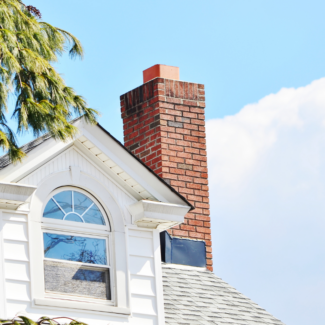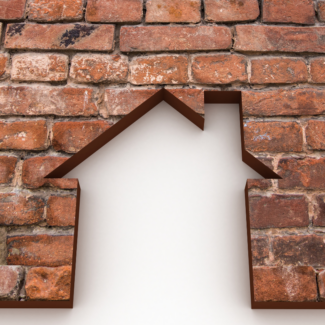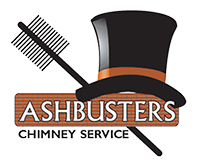Water is the enemy of brick and mortar and a leaky chimney can turn into danger for your home and for your checkbook. What starts as a seemingly small problem can quickly turn into disaster. Chimney leaks can cause moisture to seep into your home’s interior, leading to costly repairs and possibly even health problems from mold and mildew growth.
How Can I Identify Chimney Leaks?
What are some common signs of chimney leaks?
WATER STAINS ON WALLS & CEILING
 This is a very common sign that your chimney is leaking. Water stains are often brown or yellowish and can be circular or irregularly shaped. And just because you might not see them in your living room doesn’t mean that they aren’t in the attic. If you have an attic above your chimney, make sure you regularly check to make sure there are no stains on the walls or ceiling there, either.
This is a very common sign that your chimney is leaking. Water stains are often brown or yellowish and can be circular or irregularly shaped. And just because you might not see them in your living room doesn’t mean that they aren’t in the attic. If you have an attic above your chimney, make sure you regularly check to make sure there are no stains on the walls or ceiling there, either.
MUSTY ODORS
If you smell a musty odor coming from your fireplace or chimney, it’s likely a sign that moisture is present. As the moisture mixes with the creosote, soot, and other chemicals built up in your chimney it can cause mold, mildew, and odors that are unpleasant.
CRACKED/DAMAGED CROWN
The chimney crown is the top part of the chimney, and it’s designed to protect the chimney from water damage. If it’s cracked or damaged, water can seep through the cracks and into your home.
DETERIORATED DAMPER OR FIREBOX
If you notice rust, holes, or cracks on your damper or anywhere in your firebox, it’s a sign that moisture might be present and causing problems.
CRACKED OR CRUMBLING MASONRY
If your masonry is showing cracks, seems brittle, or is falling apart there is very likely water present and something called spalling (which is due to the freeze/thaw process) is occurring.
How Can Water Damage Masonry?
Bricks and mortar are porous, meaning they absorb water. They have many tiny places for moisture to collect. If your chimney is exposed to rainwater, snow, or ice, the moisture can seep into the bricks and mortar, causing them to crack, crumble, and deteriorate over time. When the water inside the bricks and mortar freezes, it expands, leading to more damage. This process is known as spalling, which is caused by the freeze/thaw process.
What is the freeze/thaw process?
The freeze/thaw process is a major cause of water damage to chimneys. During the winter months, water that has penetrated your chimney’s masonry freezes and expands, leading to cracks and fissures. When the water thaws, it contracts and pulls away from the masonry, causing even more damage.
This cycle continues until the masonry is severely damaged, often leading to gaps in the bricks which, if not fixed quickly, can lead to your chimney toppling over and causing your home major damages – which are costly to repair.
How Can I Avoid a Leaky Chimney?
The best way to safeguard against water damage is to waterproof your chimney.
Waterproofing a chimney involves sealing any gaps or cracks that could allow water to seep into your home. The process typically involves applying a waterproof sealant to your chimney’s masonry. The sealant creates a barrier that prevents water from penetrating your masonry, while still allowing any pre-absorbed moisture to vent out.
Can I waterproof my chimney myself?
While there are DIY waterproofing products available, it’s always best to trust a professional from Ashbusters here in Nashville to waterproof your chimney. Here’s why:
 Our professionals have over 37 years experience. We train our technicians with the expertise needed to identify potential problem areas and address them before they become bigger issues. Waterproofing before taking care of these problems (that might be invisible to an untrained eye) can render the waterproofing useless and cause more problems in the future.
Our professionals have over 37 years experience. We train our technicians with the expertise needed to identify potential problem areas and address them before they become bigger issues. Waterproofing before taking care of these problems (that might be invisible to an untrained eye) can render the waterproofing useless and cause more problems in the future.- The products available to retailers aren’t always vapor permeable, which is important for chimneys. Moisture should be blocked from coming in, but any pre-absorbed moisture needs to be able to vent out. The makeup of the products that are used in waterproofing matter and the techs at Ashbusters are equipped with the right tools and products to make sure water is kept out, while moisture isn’t trapped in.
- In addition to vapor-permeable products, it is important to have the knowledge that will provide your specific chimney with what it needs for water-repelling success. Our techs at Ashbusters are able to apply the right type of waterproofing product for your chimney’s specific needs. There are different types of sealants available, and a professional will know which one will work best for your chimney’s makeup and location.
Count On Us for Protection From Chimney Leaks
Chimney leaks can cause significant damage to your home’s structure and be dangerous. If you suspect that your chimney is leaking, it’s essential to address the issue promptly. Water can damage your masonry by causing bricks and mortar to crack, crumble, and deteriorate over time. The freeze/thaw process can also cause severe damage to your chimney’s masonry during the winter months.
At Ashbusters, we have the training and expertise necessary to spot the source of your leaking problems and fix them. We desire to provide our customers an experience that leaves them confident and safe. Call us today or reach out online to schedule an inspection and chimney waterproofing.
